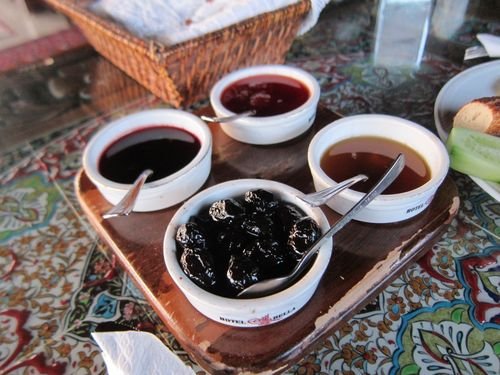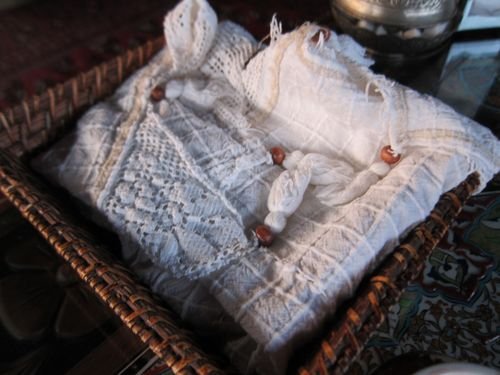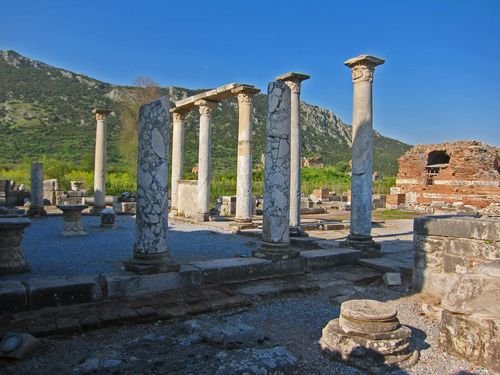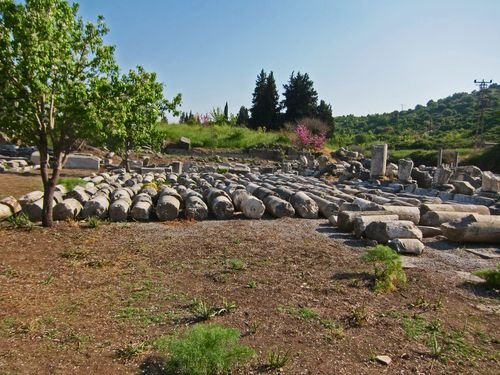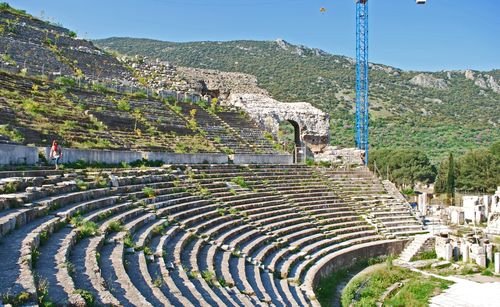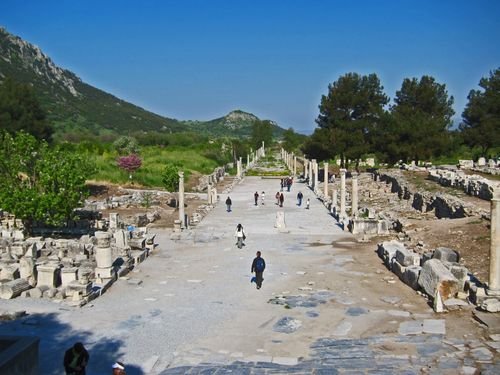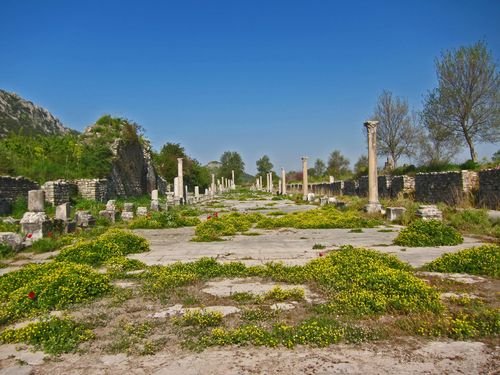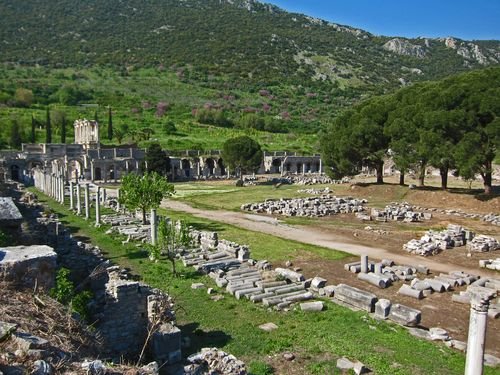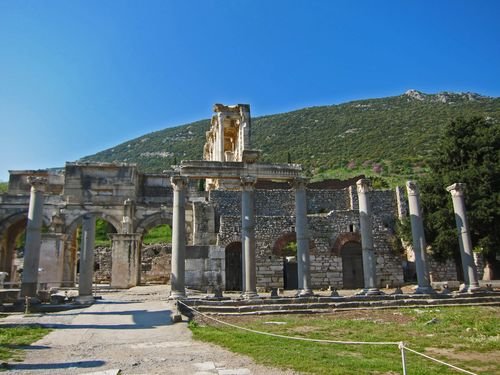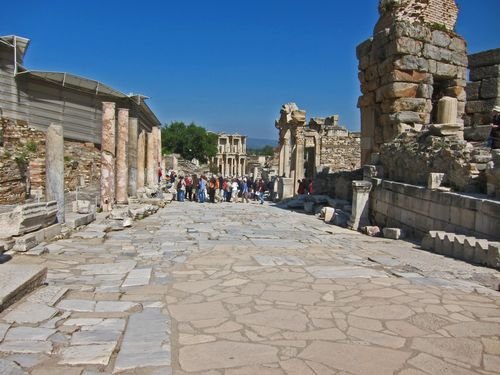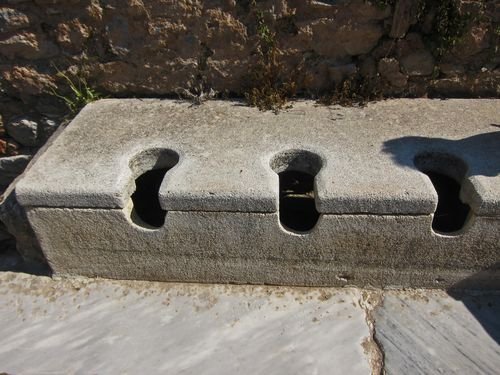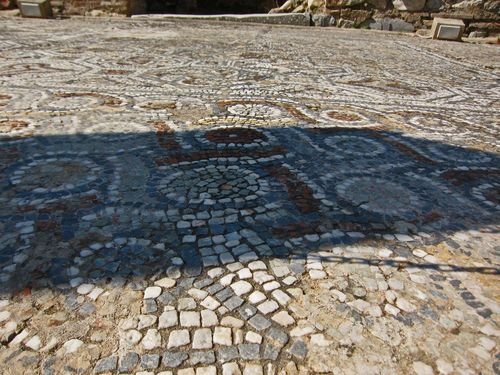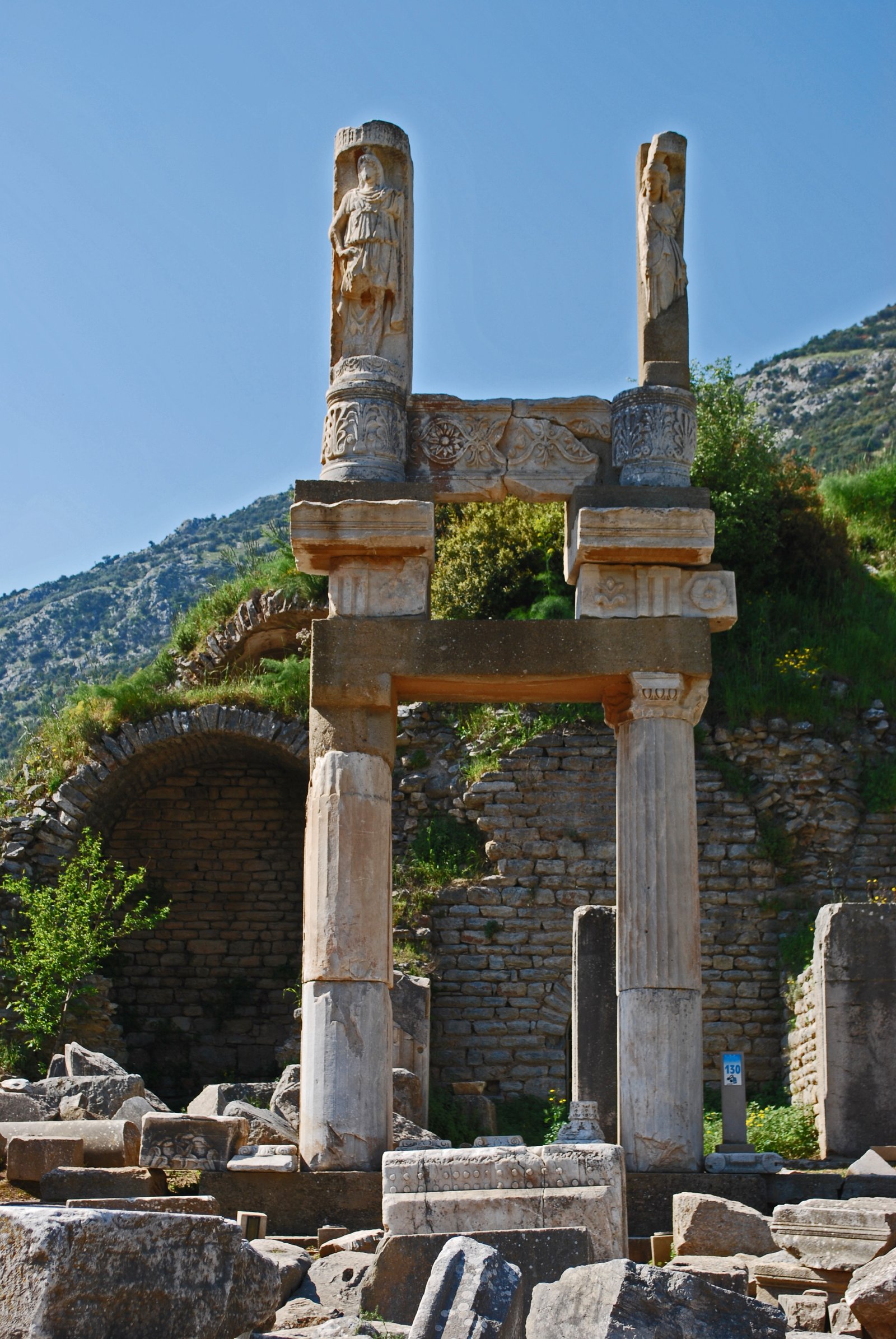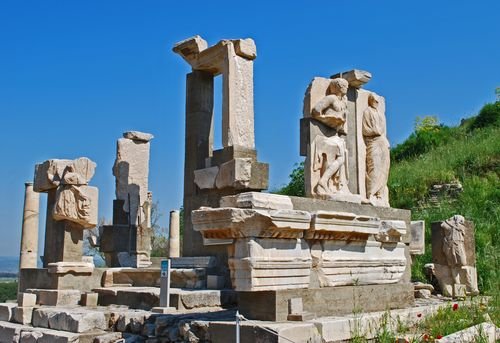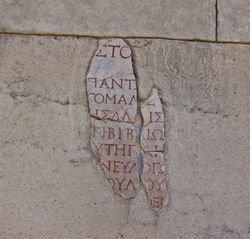We got up early on our Saturday in Selcuk, though both the Missus and I had enjoyed our time in Selcuk, we were here for one main reason; to visit Ephesus. We had an early breakfast, as with most of these places, breakfast is provided free. In comparison to other places this was just ok. Everything had been plated out ahead of time.
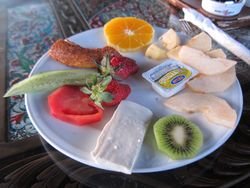 All the usual suspects were in attendance, the cheese, butter, tomato, cucumber, olives, honey….
All the usual suspects were in attendance, the cheese, butter, tomato, cucumber, olives, honey….
And of course, bread…… lots of bread….
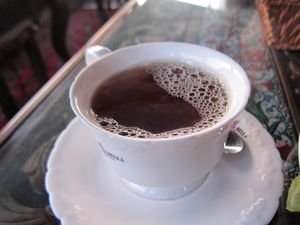 The best thing about the breakfast was the tea. Hotel Bella made a nice, fairly strong cup of Turkish Tea…..full bodied with a hint of Bergamot.
The best thing about the breakfast was the tea. Hotel Bella made a nice, fairly strong cup of Turkish Tea…..full bodied with a hint of Bergamot.
Breakfast did us good, in spite of the fact that the hotel provided free drop off and pick-up from Ephesus, we'd be walking the 5-6 kilometers to Ephesus.
We arrived at the upper entrance in a little over an hour, just after opening, and just before all the tour buses from the cruise ships ported at Kusadasi arrived. By not heading to the main gates, we'd be able to check out some of the major attractions before they too crowded. We also decided to spend a few more lira and do the audio tour, which turned out to be really informative.
It is believed that the city of Ephesus was founded somewhere around 10th century BC. Located at the crossing of major trade routes and being a major harbor town, Ephesus was once the second largest city in the Roman Empire, with a population estimated at 250,000.
Upon entering we walked down a short side path to the Church of Mary (above photo). Rebuilt and altered several times it is thought to have been built over and earlier Basilica.
Walking past the ruins of the gymnasium……
One sees the first of several amazing structures at Ephesus. The Great Theatre.
Dramatically located on the slopes of Panayir Hill, the theatre seated 25,000 and the seating is designed for maximum acoustics and view.
The theatre was also the scene of a well known biblical event. For three years the Apostle Paul lived in Ephesus, preaching the gospel. According to the book of Acts, Paul must have been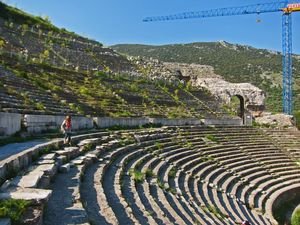 pretty successful, as the silversmiths who made their living selling idols of Artemis (Diana) had started losing business and started a riot against Paul and the spreading of Christianity. You can read it here.
pretty successful, as the silversmiths who made their living selling idols of Artemis (Diana) had started losing business and started a riot against Paul and the spreading of Christianity. You can read it here.
Stepping out of the theatre, I got a good look at Harbour Street, At 500 meters long and 11 meters wide, this was once the grandest street in Ephesus…. and probably still is.
Walking to the end of the restored area of the street, the obvious question you'd ask yourself is, "where's the harbor?"
Ephesus had become a power because of location. Besides being at the crossroads of trade, it was also located at the mouth of the Kayster River, right where it met the Aegean. In the end, it wasn't Christianity nor the Ottoman Empire that doomed Ephesus, it was the unconquerable build up of silt. Today, the last harbour of Ephesus sits over 6 miles from the river.
 The beautiful marble paved "Sacred Way" goes South from the theatre. There are spots where you can see the sewer and water systems that lay beneath these streets. There are grooves in the marble which were created by carts and wagons……
The beautiful marble paved "Sacred Way" goes South from the theatre. There are spots where you can see the sewer and water systems that lay beneath these streets. There are grooves in the marble which were created by carts and wagons……
Which probably made its way to the Agora which you can view from the street. This was probably the busiest street in Ephesus.
To the left of the Agora are the Gates of Augustus……
Which led to my favorite site, and possibly my favorite site on the entire trip (including the Parthenon), the Library of Celsus.
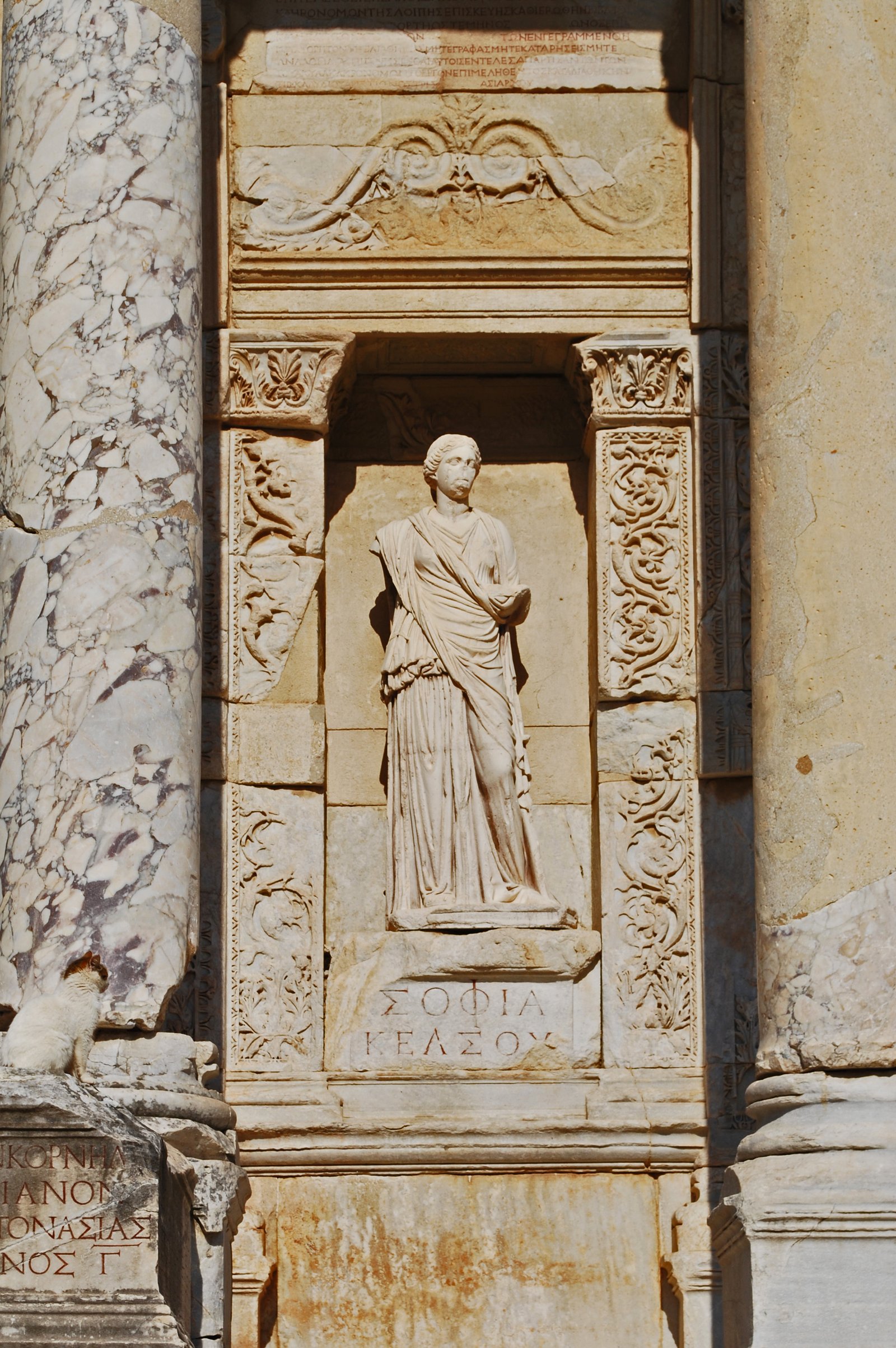 The Library of Celsus was built by Julius Celsus Polemaeanus by his son Gaius Julius Aquila. The library was built with double walls to protect the 12,000 scrolls and book from heat and humdity. The four statues in the niches in the walls of the library represent wisdom (Sophia), knowledge (Episteme), intelligence (Ennoia) and valor (Arete). That's Sophia to the right.
The Library of Celsus was built by Julius Celsus Polemaeanus by his son Gaius Julius Aquila. The library was built with double walls to protect the 12,000 scrolls and book from heat and humdity. The four statues in the niches in the walls of the library represent wisdom (Sophia), knowledge (Episteme), intelligence (Ennoia) and valor (Arete). That's Sophia to the right.
I had a bit of a difficult time tearing myself away from the Library of Celsus, but it was starting to get crowded…..
The street leading away from the library is called Curetes Way. Apparently it was a business and "high-rent" district of Ephesus.
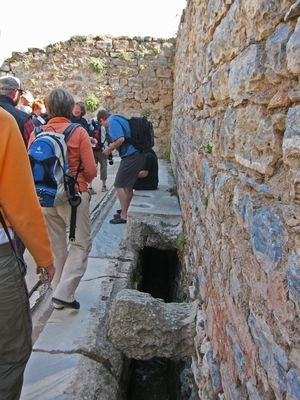 Off one of the side trails along the road is what is one of the most popular sites in Ephesus…. the communal Roman Men's toilets. Yes, there were lines of folks waiting to check out the toilets. And most could not help but to "try them out for size." Says a lot about us, doesn't it?
Off one of the side trails along the road is what is one of the most popular sites in Ephesus…. the communal Roman Men's toilets. Yes, there were lines of folks waiting to check out the toilets. And most could not help but to "try them out for size." Says a lot about us, doesn't it?
You can see where the residents lived, walk past some wonderful monuments, and see the shopping areas on the street.
There are some beautiful mosaics alongside the street.
Along one of the side streets is the Temple of Vespasian, Titus, and Domitian. Remember the huge head and arm from the Ephesus Museum? This is where it came from.
There was just so much to see, and I'm heaing into over 850 words right now, so let me just put up a few more photos, ok?
Before we knew it, we had spent almost four hours at Ephesus. It was also pretty darn hot. When we exited the Missus asked audio tour booth folks if they could call the hotel (you gotta love Turkey) which they gladly did. About fifteen minutes later we were on our way back to the hotel.
I realize that there wasn't much food in this one, so thanks for reading!

